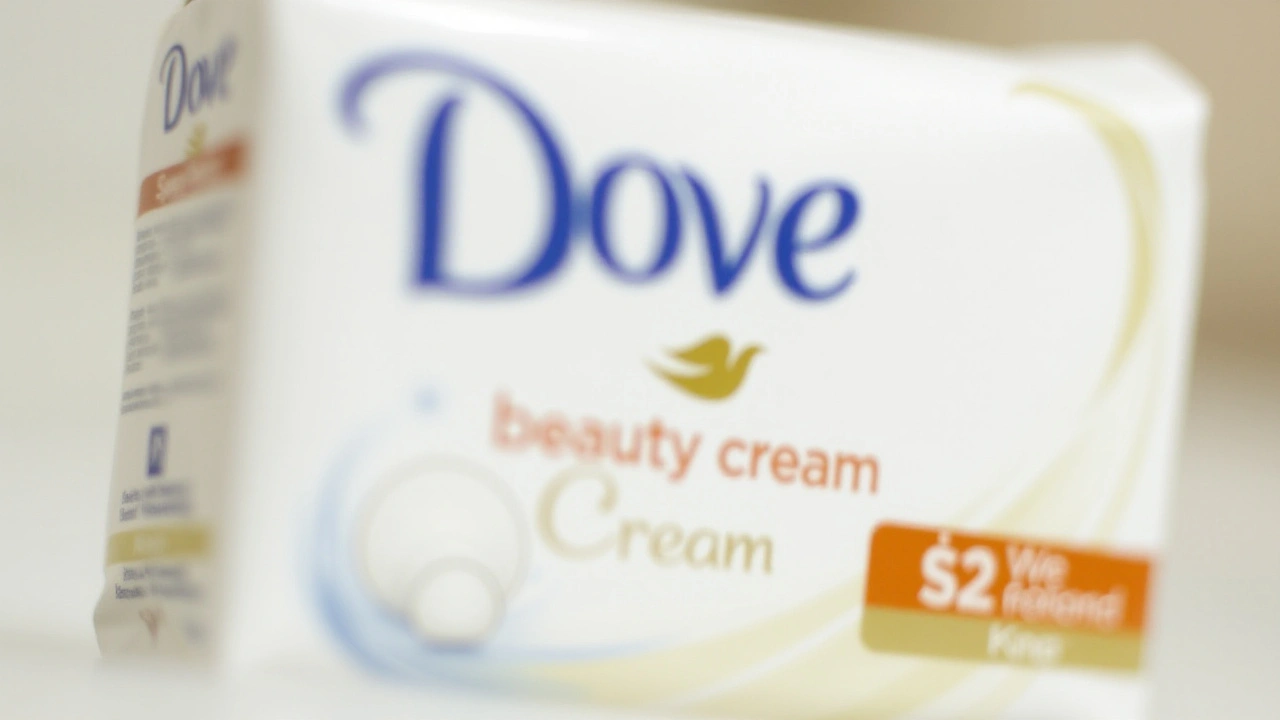NAFDAC's Commitment to Consumer Safety
In a proactive move to ensure the health and safety of consumers, the National Agency for Food and Drug Administration and Control (NAFDAC) has initiated a recall for a specific batch of Dove Cream Bar Soap. This decisive action came after the discovery of a chemical impurity in the affected products. Butyphenyl Methylpropional, also known as Lilial, was identified as the contaminant that prompted the recall. This ingredient, often used in fragrances, has raised safety concerns that led to its inclusion in the recall notice.
NAFDAC has consistently upheld high standards in regulating food and drug products within the country. The agency's swift response to this issue underscores its dedication to protecting public health. This recall is not the first time NAFDAC has acted swiftly to address potential health risks, showcasing its ongoing vigilance in safeguarding consumers.
Details of the Affected Batch
The recall specifically targets Dove Cream Bar Soap products that were manufactured in Germany. This geographical detail is crucial as it helps narrow down the potentially affected products, thereby easing the identification process for consumers. It is important to note that not all Dove Cream Bar Soaps are part of this recall, only those from the identified batch containing the hazardous chemical.
Consumers are urged to check the batch number printed on their Dove Cream Bar Soap packaging. This measure will help them determine if their product is included in the recall. If the batch number matches the one specified by NAFDAC, consumers should cease using the soap immediately.
Understanding the Chemical Impurity
Butyphenyl Methylpropional, the impurity found in the recalled Dove Cream Bar Soap, is a synthetic fragrance ingredient that has recently come under scrutiny. It is widely used in various personal care products for its floral scent. However, new research and regulatory reviews have highlighted potential safety risks associated with its use, leading to increased regulatory actions worldwide.
The inclusion of this chemical in personal care products has been linked to skin irritation and potential allergic reactions. Furthermore, there are concerns about its long-term effects on human health, which have resulted in stricter regulatory measures. NAFDAC's decision to recall the affected batch aligns with these global efforts to ensure consumer safety.
Consumer Guidance and Action
NAFDAC has provided clear instructions for consumers who may have purchased the affected Dove Cream Bar Soap. First and foremost, they should check the batch number on their soap packaging. If the batch number matches the one identified in the recall, they should stop using the product immediately. It is advisable to return the soap to the point of purchase or contact Dove's customer service for further instructions.
Consumers should dispose of the affected product properly to prevent any accidental use. Additionally, it is recommended to monitor any skin reactions or health issues that may arise from using the product previously. NAFDAC's consumer hotline and website offer further guidance and support for individuals seeking more information or experiencing health concerns.
NAFDAC's Role in Public Health
NAFDAC has always been at the forefront of ensuring the quality and safety of food and drug products available to consumers. Its regulatory actions span a wide range of products, from pharmaceuticals to cosmetics, ensuring that they meet stringent standards. The recent recall of Dove Cream Bar Soap is a testament to the agency's unwavering commitment to public health.
The agency employs advanced testing methods and collaborates with international regulatory bodies to maintain high-quality standards. This collaborative approach ensures that any potential health risks are swiftly identified and addressed, providing consumers with the confidence that NAFDAC is vigilantly monitoring product safety.
Looking Ahead
The recall of the Dove Cream Bar Soap serves as a reminder of the importance of regulatory oversight in consumer products. As research and technology advance, new insights into the safety of ingredients are discovered, prompting necessary actions like recalls to protect public health.
NAFDAC's proactive stance in this situation highlights the dynamic nature of product safety regulations. Continuous monitoring and updates to regulations are essential to adapt to emerging health concerns. Consumers can trust that NAFDAC will continue to prioritize their safety through vigilant oversight and prompt actions.
In conclusion, the recall of a specific batch of Dove Cream Bar Soap by NAFDAC due to the presence of Butyphenyl Methylpropional reflects the agency's commitment to maintaining rigorous safety standards. Consumers are urged to check their products and follow the guidance provided to ensure their safety. This recall not only protects public health but also reinforces the role of regulatory bodies in safeguarding consumers against potential risks.
Consumer Safety First
NAFDAC's prompt action in recalling the affected batch of Dove Cream Bar Soap underscores the importance of consumer safety. The agency's efforts to remove potentially harmful products from the market demonstrate a proactive approach to public health. As consumers, it is crucial to stay informed about product recalls and adhere to the guidance provided to ensure personal safety.
By remaining vigilant and following NAFDAC's recommendations, we can collectively contribute to a safer and healthier community. The recall of Dove Cream Bar Soap is a significant step in this ongoing effort, reminding us all of the importance of regulatory oversight and consumer awareness.







Posts Comments
Derek Pholms September 11, 2024 AT 15:32
So we're now regulating fragrances like they're nuclear waste? Interesting. Lilial's been banned in the EU since 2022, but here we are, playing catch-up with a soap bar. At least NAFDAC's doing something instead of just issuing press releases.
Still, I wonder how many people actually check batch numbers. Most folks just toss it in the cart and forget. This is the same reason we still get fake pharmaceuticals in markets across Africa and South Asia.
Stephanie Reed September 12, 2024 AT 12:27
I’ve used Dove for years. I’m not panicking, but I’m checking my bathroom cabinet right now. If it’s the bad batch, I’m returning it. Better safe than sorry, right?
Also, props to NAFDAC for being transparent. Too many agencies hide this stuff.
Elizabeth Alfonso Prieto September 13, 2024 AT 05:06
I KNEW IT. I KNEW IT. I’ve been saying for years that these 'gentle' soaps are full of poison. My skin breaks out every time I use them. This is proof! Why do companies even put this crap in products? They don’t care about us. Only profit.
Also, why is it always women’s products? Why not test men’s deodorants? Hypocrites.
Harry Adams September 13, 2024 AT 09:55
Lilial. Not even a real word. Sounds like a failed sci-fi character. But let’s be real - this is performative regulation. The EU banned it two years ago. NAFDAC only acts when the West does. It’s not about safety. It’s about global image.
Arvind Singh Chauhan September 14, 2024 AT 21:41
The presence of Butyphenyl Methylpropional, a synthetic fragrance allergen, in consumer-grade personal care products represents a systemic failure in supply-chain oversight, particularly when such substances are known to induce IgE-mediated hypersensitivity reactions in susceptible populations. The regulatory lag, while frustrating, is not anomalous in jurisdictions with under-resourced toxicological monitoring infrastructure.
That said, the recall protocol appears methodologically sound: batch-specific identification, clear consumer directives, and institutional transparency. The real issue lies in the normalization of cosmetic fragrances as inert additives, when in fact they constitute the third most common cause of contact dermatitis globally.
musa dogan September 15, 2024 AT 16:01
OH MY GOD. A DOWE SOAP RECALL?!?! This is the scandal of the decade! I’ve been using this soap since I was a child - my skin glowed like a goddess! Now? Now it’s poison?! I feel betrayed. Like a lover turned traitor. The fragrance was my soul’s lullaby. Now? It’s a chemical dagger in the dark.
Who will protect us? Who will guard the sacred bars of cleanliness? NAFDAC, you are my knight. I will weep for my soap.
AAMITESH BANERJEE September 15, 2024 AT 22:42
Honestly, I’m not surprised. I’ve always thought those fancy-smelling soaps are just perfume in disguise. I switched to plain glycerin bars years ago - no scent, no drama, no mystery chemicals. My skin doesn’t itch anymore.
And yeah, I get that NAFDAC is doing the right thing, but why does it always take a recall to make people care? If this was a new phone with a battery that explodes, everyone would be screaming. But a soap? Nah. We’ll just buy another one.
Brian Gallagher September 16, 2024 AT 12:19
The regulatory action undertaken by NAFDAC constitutes a paradigmatic example of risk mitigation aligned with the precautionary principle as codified in international cosmetic safety frameworks, notably under the EU Commission Regulation (EC) No 1223/2009 and subsequent amendments.
It is noteworthy that Butyphenyl Methylpropional (CAS 80-54-6) was classified as a Category 1B reproductive toxicant under CLP Regulation, triggering its inclusion in Annex II of the EU Cosmetic Regulation. The absence of robust pre-market toxicokinetic data in low- and middle-income jurisdictions often necessitates reactive, rather than proactive, interventions.
While the recall is commendable, systemic capacity-building in analytical toxicology and supply-chain traceability remains critically underfunded.
Kieran Scott September 17, 2024 AT 06:37
Let’s be brutally honest - this is a PR stunt. Lilial has been in use for decades. The only reason it’s suddenly dangerous is because some influencer in Stockholm posted a TikTok about ‘chemical-free skincare.’
Meanwhile, people are drinking tap water with lead, eating fish with mercury, and breathing air thick with PM2.5 - but we’re shutting down a soap bar because it smells nice? This isn’t safety. This is virtue signaling wrapped in a lab report.
Akshat Umrao September 17, 2024 AT 11:28
I checked my soap 😅 it’s fine. Phew. But now I’m kinda scared to use anything with 'fragrance' on the label. Maybe I’ll go back to soap nuts. Or just wash with water. 🤷♂️
Sonu Kumar September 18, 2024 AT 09:06
Ah yes. The classic 'chemical scare' - the new religion of the modern consumer. Lilial? A word so obscure, it barely exists outside of regulatory annexes. But oh no - the masses must be protected from the horror of floral notes!
Meanwhile, the same people who panic over this soap will happily inhale diesel fumes, drink bottled water in plastic that leaches phthalates, and use 'natural' essential oils that are 10x more allergenic.
It’s not about safety. It’s about moral superiority disguised as science.
sunil kumar September 19, 2024 AT 09:17
I find it curious that the recall targets only the German-manufactured batch. This implies that production standards vary by region, which raises questions about global harmonization of cosmetic manufacturing protocols.
Is the ingredient permitted in other jurisdictions? What testing protocols were used to detect the impurity? Was it a batch-specific contamination, or a systemic formulation flaw?
Transparency in methodology would enhance public trust. Without it, this appears reactive rather than evidence-based.
Mark Dodak September 21, 2024 AT 08:46
I’ve been using Dove since I was a kid. My mom used it, my grandma used it. I didn’t even know it had fragrance chemicals in it. I just thought it was… gentle.
Now I’m looking at every bar of soap in my house like it’s a ticking bomb. I guess I’m switching to unscented Castile soap. Or maybe I’ll just use water.
It’s weird - we’ve gone from ‘clean is good’ to ‘everything is poison.’ I miss when soap was just soap.
Jason Lo September 21, 2024 AT 21:18
You people are ridiculous. You’re acting like this soap is going to kill you. It’s a bar of soap. You’re not ingesting it. You’re not injecting it. You’re washing your skin with it.
If you’re allergic to lilial, don’t use it. Simple. But don’t turn this into a global crisis because your skin broke out once.
Also - NAFDAC? You’re late. This should’ve been banned in 2015. Now you’re getting credit for doing your job? Pathetic.
Write a comment